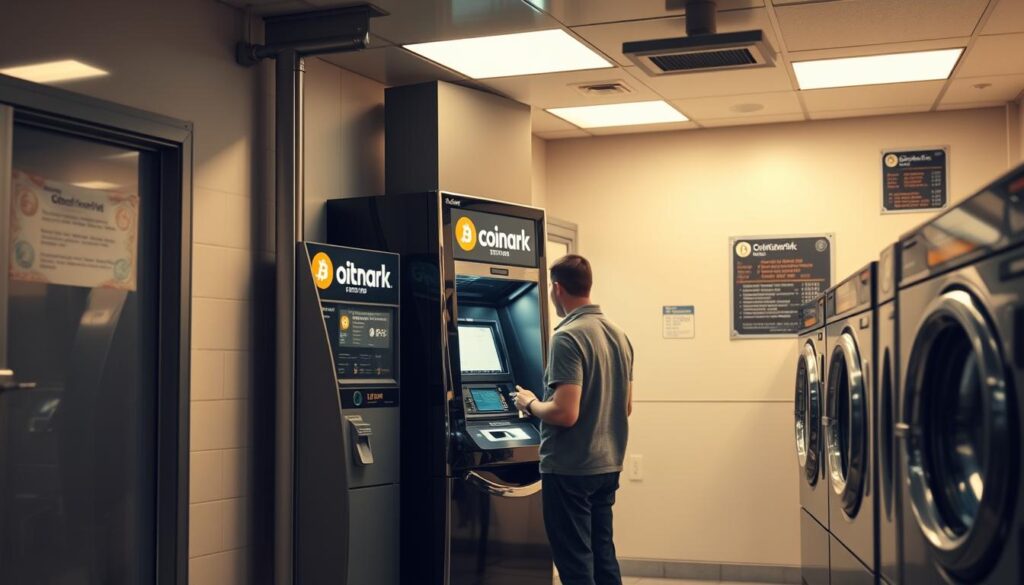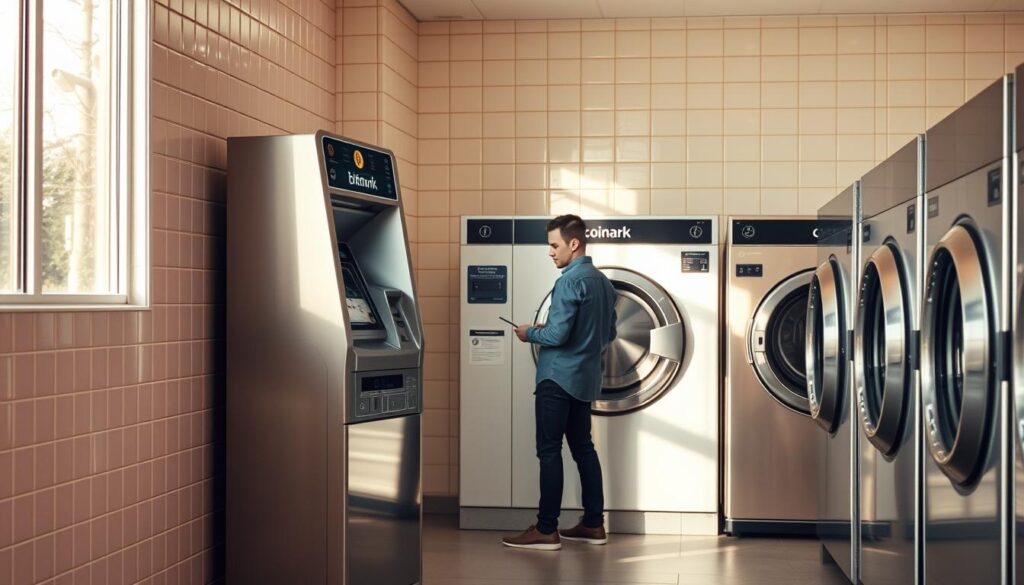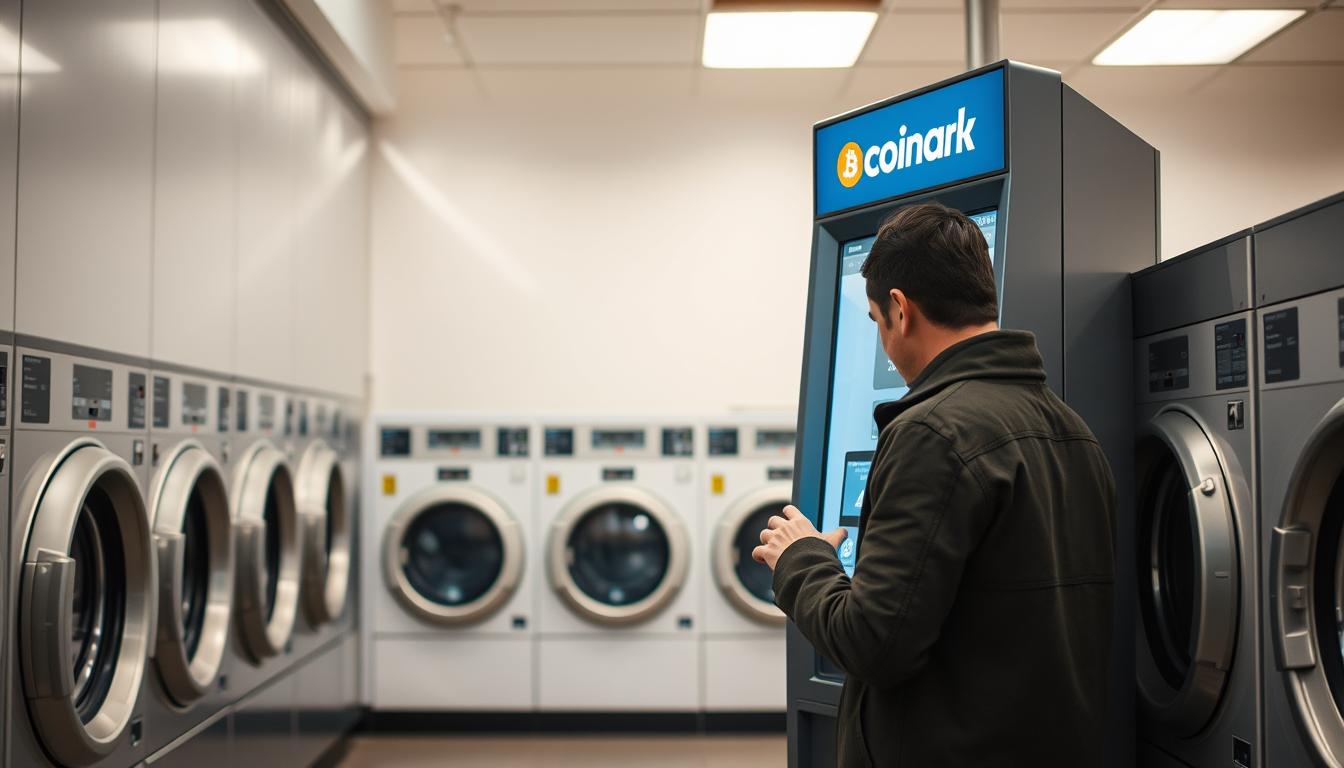The number of Bitcoin ATMs in Erie, PA, has grown a lot. Now, over 50 machines are in use. This is a 400% increase since 2018.
This fast growth, like the Coinark Bitcoin ATM at Lakeview Laundromat, shows we need to tackle regulatory challenges and risks.
Key Takeaways
- Cryptocurrency rules in Erie are changing to keep up with more Bitcoin ATMs.
- Following the rules is key for operators to avoid risks.
- The rise in Bitcoin ATMs has worried regulators.
- Operators must keep up with new crypto rules.
- Good compliance can lessen risks from Bitcoin ATMs.
The Growing Presence of Bitcoin ATMs in Erie
Erie, PA, is seeing more Bitcoin ATMs. This makes it easier for people to use digital money. It shows how more people in the US are using cryptocurrencies.
How Bitcoin ATMs Function in Today’s Market
Bitcoin ATMs let you buy or sell digital money with cash or cards. They work like regular ATMs but connect to the digital money world. These machines make it easy for people to use digital money, with a simple interface and quick transactions.
Coinark Bitcoin ATM at Lakeview Laundromat Overview
The Coinark Bitcoin ATM at Lakeview Laundromat shows how these machines fit into daily life. This ATM is in a busy laundromat, making it easy for many to use.
Location Details and Accessibility
The Coinark Bitcoin ATM is at 2340 W Grandview Blvd, Erie, PA, 16506. It’s open when the laundromat is open. It handles about 100 transactions a day, with each worth around $1,200.
Services and Cryptocurrencies Offered
| Service | Description |
|---|---|
| Buy Bitcoin | Users can purchase Bitcoin using cash or debit cards. |
| Sell Bitcoin | Users can sell their Bitcoin for cash. |
| Cryptocurrencies Available | Bitcoin and potentially other cryptocurrencies may be available. |
The Coinark Bitcoin ATM at Lakeview Laundromat is a big plus for Erie. It offers a safe and easy way for locals to use digital money.
Federal Regulatory Framework for Cryptocurrency ATMs
Cryptocurrency ATMs are getting more common in Erie, PA. It’s important to know the rules that govern them. These rules help stop bad activities and make sure everything follows financial laws.
Bank Secrecy Act (BSA) Compliance Requirements
The Bank Secrecy Act (BSA) requires strong anti-money laundering (AML) programs. This means checking who uses the ATMs, watching transactions, and telling FinCEN about any odd activities.
FinCEN Registration Process and Maintenance
Operators must sign up with FinCEN within 120 days of starting. This isn’t a one-time thing. They need to keep up with new rules to stay in line.
Anti-Money Laundering (AML) Program Implementation
Having a good AML program is key. It helps spot and stop money laundering. This includes knowing who uses the ATMs, watching transactions, and doing regular checks.
“Compliance is not just about avoiding penalties; it’s about building trust in the cryptocurrency ecosystem.” Following federal rules helps make the financial world safer and clearer for everyone in Erie.
To follow the rules, operators should keep up with BSA and FinCEN updates. They also need to train their staff and watch transactions closely. This makes a strong compliance program.
Pennsylvania State Laws Governing Cryptocurrency Kiosks
Pennsylvania has laws for cryptocurrency kiosks, affecting Erie and more. Operators must follow these rules to avoid trouble.
Money Transmitter Licensing in Pennsylvania
To run a cryptocurrency kiosk in Pennsylvania, you need a Money Transmitter License. The Pennsylvania Department of Banking and Securities issues it. You must meet certain financial and operational standards.
State-Specific Compliance Obligations
Pennsylvania has rules for kiosk operators. They must keep accurate records, report suspicious transactions, and follow anti-money laundering (AML) rules.
Recent Legislative Developments Affecting Erie Operators
Recently, Pennsylvania has made new rules for kiosks. Erie operators need to know about these changes to stay legal.
Here’s a quick list of what kiosk operators in Pennsylvania must do:
| Requirement | Description | Regulatory Body |
|---|---|---|
| Money Transmitter License | Required for operating cryptocurrency kiosks | Pennsylvania Department of Banking and Securities |
| Record Keeping | Accurate records of transactions | Pennsylvania Department of Banking and Securities |
| AML Compliance | Adherence to anti-money laundering regulations | FinCEN and Pennsylvania Department of Banking and Securities |

Erie Local Regulations and Compliance Considerations
Knowing local rules is crucial for running cryptocurrency ATMs in Erie. It’s not just about following big laws. You also need to follow local rules.
City-Specific Business Requirements
To run a Bitcoin ATM in Erie, you need to do more than just set it up. You must get the right licenses and register with local groups. You also need to follow certain rules for how you operate.
Zoning and Location Restrictions
Erie has rules about where businesses can go. For example, Bitcoin ATMs can’t just be anywhere. They need to be in areas for businesses. It’s important to talk to the City of Erie’s Planning Department to make sure you follow these rules.
| Regulation Type | Description | Compliance Requirement |
|---|---|---|
| Business Licensing | Getting the right licenses to run a Bitcoin ATM | Apply and pay fees |
| Zoning Restrictions | Following zoning laws for where to place ATMs | Look at zoning maps and get permits |
| Local Law Enforcement | Working with local police on ATM operations | Have regular meetings and report odd activities |
Local Law Enforcement Perspectives on Crypto ATMs
Police in Erie are watching cryptocurrency ATMs closely. They worry about misuse. As an operator, it’s key to work well with them. This means reporting odd stuff and helping with investigations.
In conclusion, to deal with Erie’s rules for cryptocurrency ATMs, you need to know a lot. This includes local business rules, zoning laws, and what police think. By being careful and following the rules, you can help make the crypto world safer and clearer.
Bitcoin ATM Legal Risks Erie, PA Operators Must Navigate
The legal world for Bitcoin ATM operators in Erie, PA, is full of dangers. This includes actions from regulatory bodies. It’s very important for operators to know the legal risks of their business.
Regulatory Enforcement Actions and Penalties
Regulatory groups are watching Bitcoin ATMs closely. If operators don’t follow the rules, they could face big fines or even lose their business. For example:
- Not following the Bank Secrecy Act (BSA) can mean big fines.
- Running a Bitcoin ATM without FinCEN registration can lead to trouble.
Customer Verification Failures and Consequences
Checking customers is key for Bitcoin ATM rules. If this isn’t done right, there can be serious problems. These include:
- Helping with illegal money moves.
- Being at risk for money laundering.
- Getting in trouble with AML/KYC rules.
Transaction Monitoring Deficiencies
It’s important to watch transactions closely. Not doing this well can cause big issues. These include:
- Missing money laundering.
- Not filing needed SARs (Suspicious Activity Reports).
- Getting in trouble with the law.
To avoid these dangers, Bitcoin ATM operators in Erie, PA, need to take strong steps. This includes training staff and watching transactions closely. By being proactive and informed, operators can deal with legal challenges and lower their risk.
Know Your Customer (KYC) and Identity Verification Protocols
To follow the rules, Bitcoin ATMs need strong KYC steps. Know Your Customer rules help stop bad acts like money laundering. They check who is using the ATM.
ID Verification Technologies and Methods
Bitcoin ATM owners use many ways to check IDs. These include:
- Biometric checks (like facial scans)
- Looking at documents (like driver’s licenses)
- Checking against government records
These steps make sure people are who they say they are. This lowers the chance of scams.
Transaction Thresholds and Enhanced Due Diligence
Bitcoin ATMs also have rules for big transactions. For example, deals over $1,000 need more checks. This includes deeper ID checks and watching the transaction.
| Transaction Amount | Verification Requirement |
|---|---|
| Below $1,000 | Basic ID verification |
| $1,000 – $5,000 | Enhanced due diligence |
| Above $5,000 | Advanced verification and reporting |
Privacy Considerations in Customer Data Handling
KYC rules are key but also touch on privacy. Operators must keep customer info safe while following rules. A top expert says, “Just get the data needed for checks and keep it safe.”
“The way we handle customer data matters. It keeps trust and follows data rules.”
By using strong KYC steps and caring for privacy, Bitcoin ATMs in Erie, PA, meet rules. They also keep customers’ trust.
Security Best Practices for Bitcoin ATM Users and Operators
Keeping Bitcoin ATMs safe is key for users and operators in Erie. As more people use them, we need strong security to fight off threats.
Physical Security Measures at Lakeview Laundromat Location
Bitcoin ATMs need strong physical security too. At places like the Lakeview Laundromat, there are steps to take:
- Securely mount the ATM to stop theft or tampering
- Check for vandalism or unauthorized access often
- Use good lighting and cameras to scare off criminals
Digital Security Protocols for Transactions
Operators in Erie must use strong digital security for transactions. This means:
- Update software regularly to avoid bugs
- Use strong encryption to keep user data safe
- Make users prove who they are with multi-factor authentication
Recognizing and Avoiding Common Scams
Users and operators must watch out for scams at Bitcoin ATMs. Some scams include:
- Phishing to steal login info
- Malware to harm the ATM’s software
- Tricks to get users to make bad transactions
By knowing these scams and using good security, Erie’s Bitcoin ATM users and operators can stay safe.
Tax Compliance for Bitcoin ATM Businesses and Users
Tax compliance is key for Bitcoin ATM businesses and users in Erie, Pennsylvania. As the crypto world grows, knowing and following tax rules is vital. It keeps operations legal and successful.
Federal Reporting Requirements for Operators
Bitcoin ATM operators must follow federal rules. They need to file Form 8300 for cash deals over $10,000. Accurate record-keeping is essential for this.
| Reporting Requirement | Description | Threshold |
|---|---|---|
| Form 8300 | Report of Cash Payments Over $10,000 | $10,000 |
| FinCEN Registration | Registration with the Financial Crimes Enforcement Network | N/A |
User Tax Obligations for Crypto Transactions
Bitcoin ATM users also have tax duties. The IRS sees crypto as property for tax purposes. This means capital gains tax might apply to deals.
Documentation and Record-Keeping Systems
Keeping detailed records of all deals is crucial. This includes info on user identities, transaction amounts, and when they happened.
In summary, tax compliance is complex for Bitcoin ATM businesses and users in Erie. By knowing and following federal rules, user tax duties, and keeping good records, operators can meet compliance requirements for Bitcoin ATMs. They also address legal considerations for crypto kiosks in Erie.
Launching a Compliant Bitcoin ATM Business in Erie
Starting a Bitcoin ATM business in Erie needs careful steps. The world of cryptocurrency is always changing. It’s key for entrepreneurs to know the latest rules and tips.
Business Formation and Registration Steps
To begin a Bitcoin ATM business in Erie, you must first register your company. This includes:
- Getting a business license from the City of Erie
- Registering with the Pennsylvania Department of State
- Getting an Employer Identification Number (EIN) from the IRS
Establishing Banking Relationships
Finding a bank for your Bitcoin ATM business is vital. You need to:
- Find a bank that supports cryptocurrency businesses
- Open a business checking account
- Meet the bank’s Know Your Customer (KYC) and Anti-Money Laundering (AML) rules
Here’s a look at key banking needs for crypto businesses:
| Bank | KYC Requirements | AML Compliance |
|---|---|---|
| Bank of America | Strict KYC verification | Robust AML monitoring |
| Wells Fargo | Moderate KYC verification | Standard AML procedures |
| PNC Bank | Lenient KYC for small businesses | Basic AML reporting |
Insurance and Liability Protection Strategies
To reduce risks, think about getting insurance for your Bitcoin ATM business. This could include:
- Cyber insurance to guard against hacking and cyber threats
- Liability insurance for customer disputes
- Business interruption insurance for unexpected losses

By following these steps and keeping up with Bitcoin ATM operating regulations and cryptocurrency regulations in Erie, you can start a compliant and thriving Bitcoin ATM business.
Common Compliance Pitfalls and How to Avoid Them
Working with crypto ATM businesses, I’ve found common mistakes. These can be fixed with the right steps. In Erie, PA, crypto ATM operators face a complex set of rules.
Inadequate Staff Training and Oversight
One big risk is not training staff well enough. It’s key that they know AML/KYC regulations and can check customer IDs. Regular training and checks can help avoid this problem.
Insufficient Documentation Procedures
Keeping good records is vital for following the rules. This includes keeping track of transactions, customer info, and maintenance. Not having enough records can cause big problems.
Failure to Adapt to Regulatory Changes
The rules for crypto ATMs keep changing. It’s important for operators to keep up with these changes. This means knowing about updates to FinCEN requirements and Pennsylvania laws.
| Compliance Area | Common Pitfall | Mitigation Strategy |
|---|---|---|
| Staff Training | Inadequate knowledge of AML/KYC | Regular training and audits |
| Documentation | Insufficient record-keeping | Implement robust documentation procedures |
| Regulatory Adaptation | Failure to stay updated on regulatory changes | Regularly review and update compliance policies |
Knowing these common mistakes and how to fix them helps crypto ATM operators in Erie. They can lower their risk and keep their business in line with the law.
Conclusion: Balancing Innovation and Compliance in Erie’s Crypto Landscape
Erie’s crypto market is growing fast. It’s key to mix new ideas with rules to keep it strong. People running Bitcoin ATMs in Erie, PA, face many Bitcoin ATM Legal Risks Erie, PA.
It’s important to know and follow cryptocurrency regulations in Erie. This helps Bitcoin ATMs stay safe and legal. Keeping up with laws from the government and local areas is a must.
Good rules help keep Erie’s crypto market clean. Things like strong ID checks and money tracking are crucial. As rules change, those running ATMs need to stay alert and adjust.
By focusing on both rules and new ideas, Erie’s crypto scene can grow. It will be a safe place for everyone involved.

